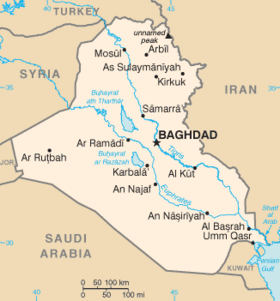Operation Zafar 7
| Operation Zafar 7 | |||||||||
|---|---|---|---|---|---|---|---|---|---|
| Part of Iran-Iraq War | |||||||||
 Map of Iraq |
|||||||||
|
|||||||||
| Belligerents | |||||||||
|
|
|
||||||||
| Commanders and leaders | |||||||||
|
|
|
||||||||
Limited Iranian victory
Operation Zafar 7 was an Iranian offensive during the Iran-Iraq War. The Iranian military operation was successfully led by Lieutenant General Ali Sayad Shirazi where Iran won the battle and also the ensuing Iraqi counter-attack. However, Iran faced technical setbacks with massive economic and military sanctions in place against the country. As a result of those setbacks, Iran was unable to reach its objective of capturing Sulaymaniyah.
After Iran's failure to capture Basra during the Second Battle of Basra (Operation Karbala-5), Iran's military entered a period of self-reflection, and possible decline. Iranian morale was decreasing, and many of their experienced infantry from the Revolutionary Guards (Pasdaran) became casualties. Consequently, the Iranians increasingly relied on their regular army to fight the war. In addition to the army being conscription based, the Iranians became increasingly war-weary. The front in the south of Iraq had become a stalemate. Iran was unable to penetrate the massive Iraqi defenses. Meanwhile, Iraq for the time being remained unable to drive the Iranians back, but they had begun to rearm with the help of the United States and the west, and were practicing maneuvers in preparation for the upcoming operations against the Iranians. By 1988, Iraq grossly outnumbered Iran in men and military hardware. Nevertheless, Iranian commanders remained skilled and adept. They focused on tactics that would negate superior Iraqi firepower. Nevertheless, they were unable to capture cities in southern Iraq due to a combination of poor logistics, shortages of armor, and Iraqi firepower. Iran's leadership also announced that they would arm and support opposition groups inside of Iraq. One of those opponents was the Peshmerga, the Kurdistan resistance force, which primarily launch limited offensives of their own.
...
Wikipedia
